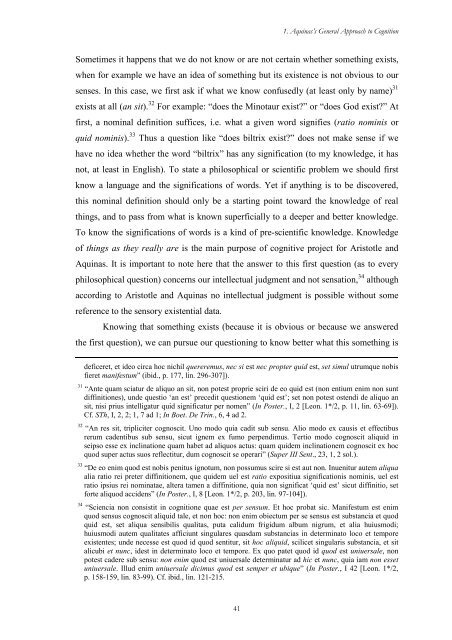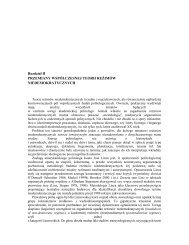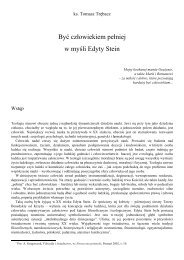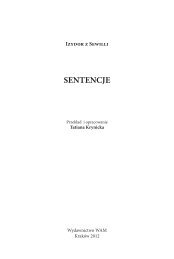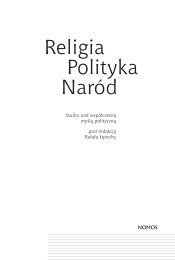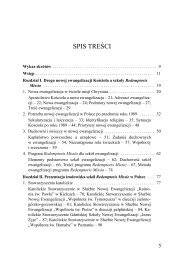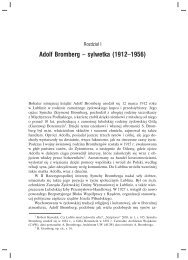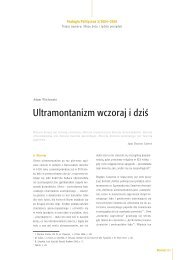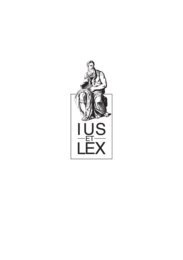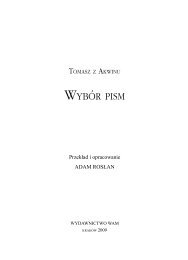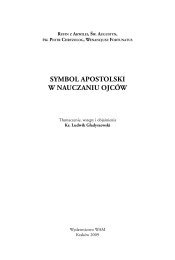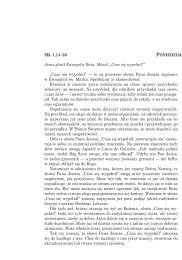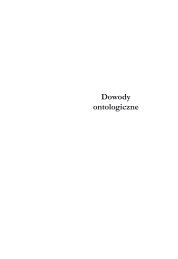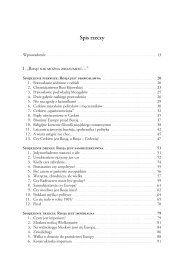Did St. Thomas Aquinas Justify the Transition from 'Is' to 'Ought'
Did St. Thomas Aquinas Justify the Transition from 'Is' to 'Ought'
Did St. Thomas Aquinas Justify the Transition from 'Is' to 'Ought'
You also want an ePaper? Increase the reach of your titles
YUMPU automatically turns print PDFs into web optimized ePapers that Google loves.
41<br />
1. <strong>Aquinas</strong>’s General Approach <strong>to</strong> Cognition<br />
Sometimes it happens that we do not know or are not certain whe<strong>the</strong>r something exists,<br />
when for example we have an idea of something but its existence is not obvious <strong>to</strong> our<br />
senses. In this case, we first ask if what we know confusedly (at least only by name) 31<br />
exists at all (an sit). 32 For example: “does <strong>the</strong> Minotaur exist?” or “does God exist?” At<br />
first, a nominal definition suffices, i.e. what a given word signifies (ratio nominis or<br />
quid nominis). 33 Thus a question like “does biltrix exist?” does not make sense if we<br />
have no idea whe<strong>the</strong>r <strong>the</strong> word “biltrix” has any signification (<strong>to</strong> my knowledge, it has<br />
not, at least in English). To state a philosophical or scientific problem we should first<br />
know a language and <strong>the</strong> significations of words. Yet if anything is <strong>to</strong> be discovered,<br />
this nominal definition should only be a starting point <strong>to</strong>ward <strong>the</strong> knowledge of real<br />
things, and <strong>to</strong> pass <strong>from</strong> what is known superficially <strong>to</strong> a deeper and better knowledge.<br />
To know <strong>the</strong> significations of words is a kind of pre-scientific knowledge. Knowledge<br />
of things as <strong>the</strong>y really are is <strong>the</strong> main purpose of cognitive project for Aris<strong>to</strong>tle and<br />
<strong>Aquinas</strong>. It is important <strong>to</strong> note here that <strong>the</strong> answer <strong>to</strong> this first question (as <strong>to</strong> every<br />
philosophical question) concerns our intellectual judgment and not sensation, 34 although<br />
according <strong>to</strong> Aris<strong>to</strong>tle and <strong>Aquinas</strong> no intellectual judgment is possible without some<br />
reference <strong>to</strong> <strong>the</strong> sensory existential data.<br />
Knowing that something exists (because it is obvious or because we answered<br />
<strong>the</strong> first question), we can pursue our questioning <strong>to</strong> know better what this something is<br />
deficeret, et ideo circa hoc nichil quereremus, nec si est nec propter quid est, set simul utrumque nobis<br />
fieret manifestum” (ibid., p. 177, lin. 296-307]).<br />
31 “Ante quam sciatur de aliquo an sit, non potest proprie sciri de eo quid est (non entium enim non sunt<br />
diffinitiones), unde questio ‘an est’ precedit questionem ‘quid est’; set non potest ostendi de aliquo an<br />
sit, nisi prius intelligatur quid significatur per nomen” (In Poster., I, 2 [Leon. 1*/2, p. 11, lin. 63-69]).<br />
Cf. STh, I, 2, 2; 1, 7 ad 1; In Boet. De Trin., 6, 4 ad 2.<br />
32 “An res sit, tripliciter cognoscit. Uno modo quia cadit sub sensu. Alio modo ex causis et effectibus<br />
rerum cadentibus sub sensu, sicut ignem ex fumo perpendimus. Tertio modo cognoscit aliquid in<br />
seipso esse ex inclinatione quam habet ad aliquos actus: quam quidem inclinationem cognoscit ex hoc<br />
quod super actus suos reflectitur, dum cognoscit se operari” (Super III Sent., 23, 1, 2 sol.).<br />
33 “De eo enim quod est nobis penitus ignotum, non possumus scire si est aut non. Inuenitur autem aliqua<br />
alia ratio rei preter diffinitionem, que quidem uel est ratio expositiua significationis nominis, uel est<br />
ratio ipsius rei nominatae, altera tamen a diffinitione, quia non significat ‘quid est’ sicut diffinitio, set<br />
forte aliquod accidens” (In Poster., I, 8 [Leon. 1*/2, p. 203, lin. 97-104]).<br />
34 “Sciencia non consistit in cognitione quae est per sensum. Et hoc probat sic. Manifestum est enim<br />
quod sensus cognoscit aliquid tale, et non hoc: non enim obiectum per se sensus est substancia et quod<br />
quid est, set aliqua sensibilis qualitas, puta calidum frigidum album nigrum, et alia huiusmodi;<br />
huiusmodi autem qualitates afficiunt singulares quasdam substancias in determina<strong>to</strong> loco et tempore<br />
existentes; unde necesse est quod id quod sentitur, sit hoc aliquid, scilicet singularis substancia, et sit<br />
alicubi et nunc, idest in determina<strong>to</strong> loco et tempore. Ex quo patet quod id quod est uniuersale, non<br />
potest cadere sub sensu: non enim quod est uniuersale determinatur ad hic et nunc, quia iam non esset<br />
uniuersale. Illud enim uniuersale dicimus quod est semper et ubique” (In Poster., I 42 [Leon. 1*/2,<br />
p. 158-159, lin. 83-99). Cf. ibid., lin. 121-215.


